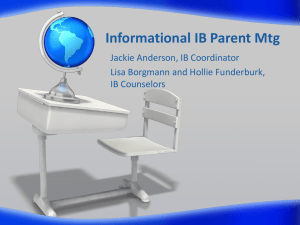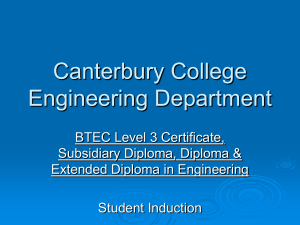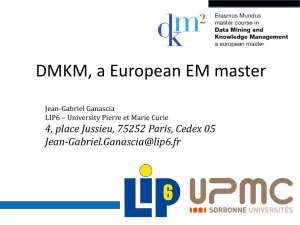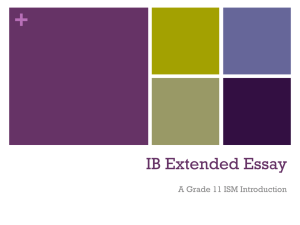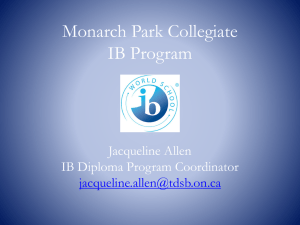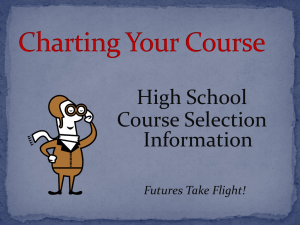Occupational Diploma Task Force
advertisement
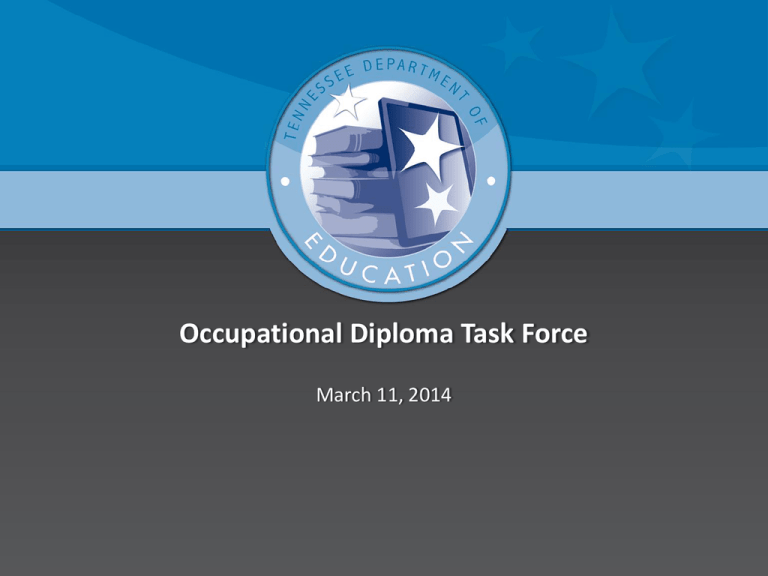
Occupational Diploma Task Force March 11, 2014 Welcome Occupational Diploma Task Force March 11, 2014 AGENDA 9:00 Welcome 9:05 Review work previously completed 9:15 Policy proposal and Introduction to SKEMA 9:30 Table Group Discussion and Activity Reduce the Critical Skills to essential components of no more than 10 skill Increase the Critical Knowledge to reflect core instruction and academic skills Reduce the Critical Experience to essential components of no more than 10 11:15 Lunch Provided 12:00 Finalize the Critical Skills 12:45 Additional questions and proposed solutions 1:45 Assess proposal for agreement moving forward 2 Work we previously completed Discussion of the bill and the charge of the task force • What population of students • What we know • What we need to know • What is needed for the policy Development of “Soft Skills” required for student success • Determined the skills for various domains across environments Development of “Hard Skills” required for student success • Determined the skills underlying the 21st Century Skills Evaluated skills for: Critical, Preferred, and Enhancing 3 Bulls-Eye Revisited Last meeting we took all the soft skills and hard skills and prioritized them according to the following: • Critical • Preferred • Enhancing The Critical skills were them shared as a group to create one, complied Bulls-Eye The skills also center around three domains: • Skills—soft skills • Knowledge—hard skills • Experience—work experience both paid and non-paid 4 Skills, Knowledge, and Experience Mastery Assessment (SKEMA) Adopting a model brought to us from Pat Beane and her work within Mississippi and Memphis/Shelby Critical skills, knowledge, and experience are the required level of mastery to achieve an occupational diploma. The tool allows students to also have documentation of preferred and enhancing skills that they have mastered so they can share this with potential employers. A simple, easily managed documentation tool. The content is a direct reflection of the work from the occupational diploma task force. 5 6 Today’s Work • Reduce the Critical Skills and Preferred Skills • Combine Similar Skills • 10 or less is the goal • Measurable or observable skills • Increase the Critical Knowledge and Preferred Knowledge to reflect core instruction and academic skills • Reduce the Critical Experience and Preferred Experience • Combine Similar Skills • 10 or less is the goal • Measurable or observable skills 7 Lunch We will debrief after returning from lunch 8 Finalize “Critical” Content of SKEMA Finalize our Critical content • What are the 10 Critical Skills? • What are the 10 Critical Knowledge behaviors? • What are the 10 Critical Experience behaviors? Finalize our Preferred content • What are the 10 Preferred Skills? • What are the 10 Preferred Knowledge behaviors? • What are the 10 Preferred Experience behaviors? Is there a Preferred Skill, Knowledge, or Experience that needs added to the Critical list? 9 Questions We Need to Consider 1. Why would a high school want to offer an occupational diploma? The occupational diploma is a reflection of the work currently at the State around Instructionally Appropriate IEPs and the new assessments, in this case, around National Center and State Collaborative (NCSC) and Partnership for Assessment of Readiness for College and Careers (PARCC). The occupational diploma is a natural fit into these instructional shifts. It is an opportunity for students to obtain instruction and skills required to earn a wage, live as independently as possible, engage with peers socially, and be productive tax-paying citizens. 10 Questions We Need to Consider 2. If a student is on track but not at the four year mark, maybe 5 year, then what? What is our standard? The policy states that it is awarded after 4 years of high school but, the policy also states that the students may return to work on a general diploma. A special education diploma recipient is also allowed to return to work towards a general education diploma. Perhaps, another option may be for students who receive a special educational diploma at the end of four years to return for the occupational diploma as it is a more rigorously defined diploma and may lead to better post-school work outcomes. 11 Questions We Need to Consider 3. How does this fit into the IEP transition plan? Students who are 14 years or older have a transition plan. The plan includes a focused plan of study (course of study) and post-secondary measurable goals. The work that a student is completing directly related to achieving the occupational diploma can be directly reflected in the plan of study and the goals. 12 Questions We Need to Consider 4. How will we phase in the students as the core instruction becomes increasingly available through instructionally appropriate IEPs? Our current 11th graders participating the first year may not have had the opportunities to learn the skills, knowledge, or experience and one year is not sufficient time. This is a question that was not anticipated within the first work on the bill as there was not a pilot written into the process. However, it is becoming clear that a pilot would strengthen the policy. 13 Questions We Need to Consider 5. What training is needed? Superintendents and special education directors first must be aware of what the policy is and how it relates to the teaching practices within the schools currently. Additionally, training on the SKEMA tool will need to be provided to every teacher that may be assessing students towards the occupational diploma. 14 Questions We Need to Consider 6. What are we missing? 15 Next Steps We will be presenting the policy for a first read on March 16th at the State Board of Education. Following this work today, we will be taking the work to businesses for feedback and input prior to the second reading in July. Pilot schools need to be identified. Are you willing to be a pilot school? Talk to your administrators now about this opportunity. We will need several Pilot schools. 2nd reading in July at the State Board of Education. Pilot data reviewed Process is finalized. 16 Thank You 17
